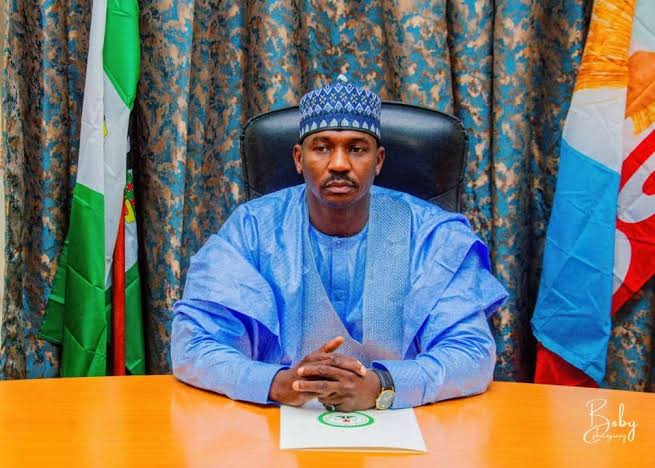By Abubakar Dan Ali
Every sector of life in Sokoto State has felt the positive impact of the transformative leadership unleashed by the administration of Governor Ahmad Aliyu of Sokoto. The health sector is no exception. A recent interview granted by the Honourable Commissioner for Health, Dr. Faruk Umar Abubakar, provided a panoramic view of the diligent and carefully targeted initiatives introduced by the administration since its inception in 2023 to revive, expand, and improve healthcare delivery across Sokoto State for the benefit of the people of Sokoto State.
Indeed, the Sokoto State healthcare system was critically ill and close to complete collapse when Governor Ahmad Aliyu assumed office. In the professional assessment of the Honourable Commissioner for Health, Dr. Faruk Umar Abubakar, “the entire Sokoto State healthcare system was on its knees due to years of abject neglect by the Aminu Tambuwal administration. Infrastructure at hospitals was practically non-existent, with obsolete equipment, decayed and uninhabitable wards even the mattresses were torn into pieces, and the beds were broken.”
Thus, a carefully planned rescue mission was urgently needed, backed by a leader with the burning zeal and determination to solve problems and deliver quality services to the people.
As the Commissioner emphasized in the syndicated interview, Governor Ahmad Aliyu has proven to be the kind of leader needed to turn things around for the better – not only in healthcare but across all critical growth and development sectors. As with other areas, the healthcare improvement initiatives are anchored on Governor Aliyu’s famous 9 -Point Smart Agenda, a framework for inclusive and result-oriented development. Healthcare appears as a top priority in this agenda, a fact clearly reflected in the budgetary allocation to the Ministry of Health over the past two fiscal years that the governor has been in charge.
For instance, in the 2025 budget, Governor Aliyu earmarked ₦84.3 billion—representing 16% of the ₦526.88 billion budget for the health sector.
So far, commendable results have been achieved through various sector-wide enhancement initiatives targeting healthcare infrastructure, staffing and manpower development, acquisition of modern medical equipment, expanded maternal and preventive health services, increased focus on mental health, and strategic partnerships. These efforts have no doubt significantly contributed to reviving the once comatose system and building a more resilient and responsive healthcare sector in the Seat of the Caliphate.
If the current tempo is sustained—as the government has pledged—Sokoto State residents can confidently look forward to a modern health system, primed for broader access, improved services, and affordability.
As would be expected, a sizeable portion of the state’s health budget has been committed to strategic upgrade initiatives in the 21 state government hospitals and 824 other health facilities spread across the 23 local government areas and 244 wards of the state. These include primary health centres, clinics, and health posts—most of which were either moribund or in a state of total disrepair before Governor Ahmad Aliyu of Sokoto took office.
This ongoing health system infrastructural upgrade is being executed within a data-driven policy framework, guided by a professional needs assessment conducted under the leadership of Dr. Faruk Umar—a veteran with 35 years of experience in the Nigerian health system and the immediate past Registrar/CEO of the Nursing and Midwifery Council of Nigeria (NMCN).
Ten out of the 21 General Hospitals—at least three in each of the three senatorial districts—are currently receiving special attention in facility upgrades. Beyond construction and renovation, the government has procured nine ultrasound machines and X-ray equipment for these hospitals. This ensures patients can now undergo routine medical investigations without having to travel to Sokoto metropolis.
In addition, 240 beds, mattresses, and stands have been distributed to selected hospitals. The Ministry of Works has also deployed a professional three-man committee to assess the remaining government hospitals to guide the next phase of the upgrade. Ultimately, every government hospital in Sokoto will be equipped to provide modern, basic healthcare services—including 24-hour solar-powered electricity, especially in labour wards and prenatal units, functional toilets, and constant water supply, either through boreholes or overhead tanks where the government water system is unavailable.
Governor Ahmad Aliyu and his team understand that new buildings and renovated facilities alone do not automatically translate to quality healthcare. Functional healthcare systems—anywhere in the world—require the active engagement of qualified personnel.
Accordingly, the Sokoto State Government has placed strong emphasis on recruiting and training qualified health workers. Under Governor Aliyu’s leadership, the government has recruited 845 nurses and midwives to boost staffing at primary health centres.
To ensure long-term sustainability, a scholarship scheme has been introduced to support Sokoto indigenes studying medicine and allied health sciences. Currently, 270 medical students are on the state’s payroll, earning civil service Level 07 salaries (about ₦82,000 monthly). This also includes pharmacy and medical laboratory students. Upon graduation, they are required to serve the state for a period before seeking other opportunities.
In another innovative move, the government is working to address the bottleneck of housemanship placements for medical graduates. Over 100 Sokoto indigenes with medical degrees are unable to practice because they lack the mandatory one-year internship. The administration is actively pursuing accreditation of Sokoto State Specialist Hospital to provide internship slots for fresh medical and radiography graduates—an initiative that may serve as a model for other states.
This progressive strategy is in stark contrast to past suggestions, such as that by former Minister of Health, Prof. Isaac Adewole, who once advised unemployed medical graduates to consider tailoring or other vocational skills—a suggestion that drew national outrage.
But training and deployment are only part of the equation. The state government has also ensured that health workers are well-compensated and motivated. According to the Commissioner, Sokoto State pays better salaries and incentives to professional health workers than even the federal government. Special allowances are also in place to encourage health workers to serve in rural and underserved communities.
Governor Ahmad Aliyu’s administration is fighting hard on all fronts—adopting multi-pronged initiatives aimed at enhancing health services across Sokoto. These include;Infrastructure and equipment upgrade, Recruitment and training of skilled health workers, Improved access to essential services, Disease prevention and control and Strategic partnerships with global health institutions like AfDB, UNICEF, and the World Health Organisation (WHO).
These efforts are already yielding tangible results. For example, the African Development Bank (AfDB) recently approved a $46 million loan facility to support healthcare access and quality in Sokoto State. The funds will finance the construction of a 1,000-bed teaching hospital, three zonal hospitals, and six rural primary health centres. It will also support digital health records systems and integration of renewable energy solutions.
To be clear, challenges still remain. The task ahead is daunting, and much more needs to be done to make quality healthcare truly universal and accessible. However, Governor Ahmad Aliyu deserves recognition for his clear commitment, strategic vision, and early achievements in this critical sector.
If the current trajectory is maintained, Sokoto State is poised to witness a healthcare renaissance over the next six years—one that will save lives, promote wellness, and reduce preventable deaths.
In truth, Governor Ahmad Aliyu’s performance speaks volumes, and his achievements so far place a firm seal on his second-term bid in 2027.
Gatekeepers News is not liable for opinions expressed in this article, they’re strictly the writer’s







